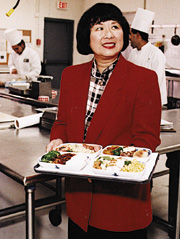|
GOLDSEA |
ASIAMS.NET |
ASIAN AMERICAN WONDER WOMEN
THE HUSTLER
PAGE 2 OF 12
A woman's magazine like Face
"too racy" for a woman who worked for years as a Playboy bunny--and
made good money at it? What compulsion could prompt a mature and respected
businesswoman to renege on her word to be interviewed, then to compound
the offense by denying that she had even consented in the first place?
A possible answer presents itself in old articles and items about Sue Ling Gin in the archives of the
Chicago Tribune, Chicago Sun-Times and Crane's Chicago Business.
They reveal that since the mid 80s Gin has made skilled use of
the media and of the minority-dominated Chicago political establishment
by playing to the hilt the role of a civic-minded minority businesswoman,
a role she might have feared would be undermined by revelations of her
more colorful, human past. The Chicago newspaper archives contain dozens
of items on Gin. Her appointments to the boards of a university, a bank,
a public untility. The savvy businesswoman who enlists the left-wing
political clout of public housing project tenants to win Flying Food
Fare a valuable food concession at Midway Airport. Joining a small group
of entrepreneurs in a luncheon with Bill Clinton prior to his departure
for trade talks with Japan. Banding together with a clique of Chicago's
minority business insiders to jostle for preference in winning what
could be a hugely lucrative riverboat gambling license. The succession
of news stories revolve around a common theme--Sue Ling Gin, minority
businesswoman extraordinaire.
Currently, millions of dollars of Flying Food Fare's
revenues come from contracts awarded by local governmental entities--the
Chicago Board of Education, Cook County jails, Amtrak, Midway Airport
and other airports. A riverboat gaming license could be so hugely lucrative
as to push Gin's business into the big time. She is currently pursuing
a joint venture with Air France to set up an airline catering business
in Shanghai. That too requires endorsements from various humorless government
agencies as well as quasi-governmental civic-groups. Clearly Gin has
staked the future growth of her enterprises on continued government
favors. Anything that undermines the picture of her as a sober minority
businesswoman, Gin has decided, may jeopardize her chances of winning
the kinds of lucrative preferences on which she has placed her bets.
[CONTINUED BELOW]
During the 1920s strict anti-Chinese-legislation kept
out all but a trickle of the most determined of Chinese immigrants.
Among them was a couple from Canton who settled in the quiet, whitebread
Chicago suburb of Aurora, Illinois. The Gins were the town's only Asians.
In fact, their son Richard, born in 1931, would become the first Asian American ever to graduate from
Aurora's East High. Five years after Richard came a daughter named Connie.
She seemed to have been born normal, according to Richard. Then something
terrible happened. By school age she was mentally retarded.
"I think when she was young, my mother dropped her on her head," Richard says. Now 64, he retired recently after a modestly successful career as a contractor. He speaks slowly with a vowel-swallowing
midwestern accent. "My dad took her around to various places and could
not do anything for her. She has a very low IQ, although some things
she knows about, but shešs not average by a long shot."
Connie did manage to get married later in life. According to Myrtle Grey, head of East High's English
department, after graduation Connie moved to Chicago and had two daughters.
At one point she had to be institutionalized and her children were taken
from her and sent to live with Richard, his wife and their two children.
Connie's kids went to East High with his own.
PAGE 3
PAGE 1 |
2 |
3 |
4 |
5 |
6 |
7 |
8 |
9 |
10 |
11 |
12 |
|
|
|
|

<
|
"I think when she was young, my mother dropped her on her head. My dad took her around to various places
and could not do anything for her."
|
CONTACT US
|
ADVERTISING INFO
© 1996-2013 Asian Media Group Inc
No part of the contents of this site may be reproduced without prior written permission.
|







